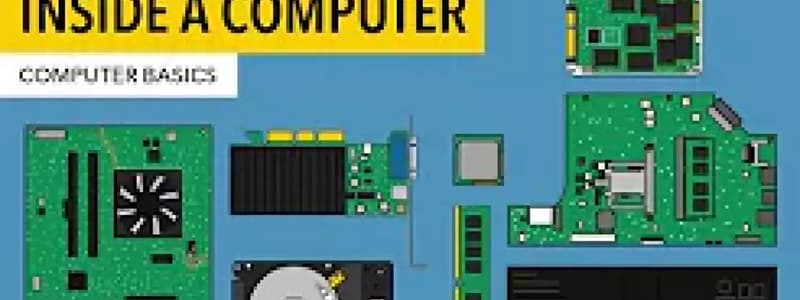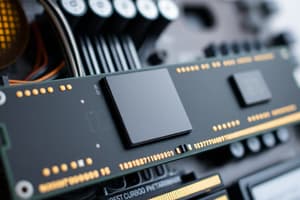Podcast
Questions and Answers
What is the primary function of the heat sink in a computer?
What is the primary function of the heat sink in a computer?
- To provide power to the computer components
- To cool the CPU by drawing heat away from it (correct)
- To store data temporarily
- To increase the processing power of the CPU
What type of memory is used for long-term storage in a computer?
What type of memory is used for long-term storage in a computer?
- Hard Drive (correct)
- RAM
- Expansion Card
- CPU
What is the primary advantage of using Solid State Drives (SSDs) over traditional hard drives?
What is the primary advantage of using Solid State Drives (SSDs) over traditional hard drives?
- SSDs are more durable and faster than hard drives (correct)
- SSDs have higher storage capacity than hard drives
- SSDs are less expensive than hard drives
- SSDs are more compatible with laptops than hard drives
What is the primary function of the Power Supply Unit (PSU) in a desktop computer?
What is the primary function of the Power Supply Unit (PSU) in a desktop computer?
Which type of computer typically does not have expansion slots?
Which type of computer typically does not have expansion slots?
Match the following computer components with their descriptions:
Match the following computer components with their descriptions:
Match the following computer components with their functions:
Match the following computer components with their functions:
Match the following computer components with their characteristics:
Match the following computer components with their characteristics:
Match the following computer components with their purposes:
Match the following computer components with their purposes:
Match the following computer components with their relationships:
Match the following computer components with their relationships:
Study Notes
Computer Components
- A motherboard is a large circuit board that contains essential parts of a computer, including the CPU, RAM, and more.
- The CPU (Central Processing Unit) is the "brain" of the computer, processing information and executing commands.
- The CPU is covered by a heat sink, a metal piece that draws heat away from the processor to prevent overheating.
Memory and Storage
- RAM (Random Access Memory) is short-term memory used for calculations, but it's cleared when the computer is shut off.
- The hard drive provides long-term storage, keeping data even when the computer is turned off.
- Hard drives use magnetic platters to store data, but Solid State Drives (SSDs) are faster, more durable, and more expensive alternatives.
Expansion and Upgrades
- Desktop computers have expansion slots on the motherboard, allowing for upgrades with expansion cards.
- Expansion cards can add features like better graphics performance (video card) or wireless connectivity (wireless card).
- Laptops typically do not have expansion slots.
Power Supply
- The Power Supply Unit (PSU) takes power from the wall outlet and distributes it to various components.
- Laptops have a built-in battery, allowing for portable use.
Motherboard
- Large circuit board containing essential computer parts, including CPU, RAM, and more.
CPU (Central Processing Unit)
- "Brain" of the computer, processing information and executing commands.
- Covered by a heat sink to prevent overheating.
Memory and Storage
- RAM (Random Access Memory): short-term memory for calculations, cleared when computer is shut off.
- Hard drive: long-term storage, keeps data even when computer is turned off.
- Hard drives use magnetic platters to store data.
- Solid State Drives (SSDs): faster, more durable, and more expensive alternatives to hard drives.
Expansion and Upgrades
- Desktop computers: expansion slots on motherboard for upgrades with expansion cards.
- Expansion cards: add features like better graphics performance (video card) or wireless connectivity (wireless card).
- Laptops: typically do not have expansion slots.
Power Supply
- Power Supply Unit (PSU): takes power from wall outlet and distributes it to various components.
- Laptops: built-in battery for portable use.
Motherboard
- Large circuit board containing essential computer parts, including CPU, RAM, and more.
CPU (Central Processing Unit)
- "Brain" of the computer, processing information and executing commands.
- Covered by a heat sink to prevent overheating.
Memory and Storage
- RAM (Random Access Memory): short-term memory for calculations, cleared when computer is shut off.
- Hard drive: long-term storage, keeps data even when computer is turned off.
- Hard drives use magnetic platters to store data.
- Solid State Drives (SSDs): faster, more durable, and more expensive alternatives to hard drives.
Expansion and Upgrades
- Desktop computers: expansion slots on motherboard for upgrades with expansion cards.
- Expansion cards: add features like better graphics performance (video card) or wireless connectivity (wireless card).
- Laptops: typically do not have expansion slots.
Power Supply
- Power Supply Unit (PSU): takes power from wall outlet and distributes it to various components.
- Laptops: built-in battery for portable use.
Motherboard
- Large circuit board containing essential computer parts, including CPU, RAM, and more.
CPU (Central Processing Unit)
- "Brain" of the computer, processing information and executing commands.
- Covered by a heat sink to prevent overheating.
Memory and Storage
- RAM (Random Access Memory): short-term memory for calculations, cleared when computer is shut off.
- Hard drive: long-term storage, keeps data even when computer is turned off.
- Hard drives use magnetic platters to store data.
- Solid State Drives (SSDs): faster, more durable, and more expensive alternatives to hard drives.
Expansion and Upgrades
- Desktop computers: expansion slots on motherboard for upgrades with expansion cards.
- Expansion cards: add features like better graphics performance (video card) or wireless connectivity (wireless card).
- Laptops: typically do not have expansion slots.
Power Supply
- Power Supply Unit (PSU): takes power from wall outlet and distributes it to various components.
- Laptops: built-in battery for portable use.
Studying That Suits You
Use AI to generate personalized quizzes and flashcards to suit your learning preferences.
Description
Learn about the essential components of a computer, including the motherboard, CPU, and RAM. Understand their functions and how they work together.




